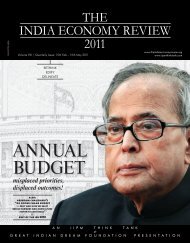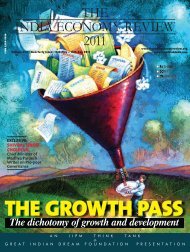Download - The India Economy Review
Download - The India Economy Review
Download - The India Economy Review
You also want an ePaper? Increase the reach of your titles
YUMPU automatically turns print PDFs into web optimized ePapers that Google loves.
macroeconomic environment and the pur-<br />
suit of much needed economic reforms in<br />
other parts of the real economy.<br />
Fiscal Autonomy of the States and<br />
Transfer System<br />
A major factor that has impeded the realisation<br />
of the goals of planning has been the<br />
tendency on the part of the centre to manage<br />
state events from central level. Soon<br />
after planning was launched, powers of<br />
controlling manufacturing investment in<br />
the private sector were occupied by the<br />
centre complemented by the control over<br />
fi nancial institutions. Even though some<br />
liability for delivering public services was<br />
dispersed to the states by the constitution,<br />
the states were supposed to follow the dictates<br />
of the centrally designed plan. However<br />
things seemed to change with liberalisation.<br />
Demanding cooperative federalism,<br />
the states seemed to be regaining their<br />
autonomy in economic policymaking. It<br />
was expected that the twin imbalances that<br />
marked the federal fi scal system would be<br />
taken care of through transfers mediated<br />
by the fi nance commission. <strong>The</strong> results<br />
achieved have however fallen short of expectations<br />
in important respects. So in<br />
implementing economic reforms needed to<br />
push the economy forward there is no alternative<br />
but to reform the fi scal institutions<br />
of the federal system. In the path of<br />
this transition from plan to market economy,<br />
it is needed to reforms <strong>India</strong>n fi scal<br />
policies and institutions.<br />
Conclusion<br />
It is widely recognized that <strong>India</strong>’s planning<br />
process has been one of the most consistent<br />
among such efforts undertaken in the Third<br />
World. <strong>The</strong> Plan efforts have contributed<br />
signifi cantly in many fi elds, most notably in<br />
the increase in food production. However,<br />
a number of problems still remain. <strong>The</strong><br />
desire for planning at multiple levels remains<br />
largely unrealized despite the commitment<br />
made by successive governments.<br />
This contradiction has seriously undermined<br />
the concept of making planning<br />
more democratic and responsive to people’s<br />
aspirations. Further, regional inequalities<br />
and income inequalities persist in <strong>India</strong><br />
despite planned economic development.<br />
This is a serious problem, which if uncorrected,<br />
can lead to more strain on the political<br />
fabric of the <strong>India</strong>n state. Centre<br />
state relations, particularly in regard to<br />
planning functions and powers to mobilize<br />
fi nancial resources, have been under stress.<br />
At the same time public resources are<br />
needed to be used optimally and thus planning<br />
is needed even in a market economy.<br />
However, the function of planning in a<br />
predominantly market-driven economy has<br />
to be symptomatic, co-coordinative and<br />
authoritarian. That provides the good reason<br />
for <strong>India</strong>’s Planning Commission to<br />
engage in preparing development plans for<br />
the economy periodically even after liberalisation.<br />
However as it can’t control investment<br />
in the private sector so such planning<br />
can at best be at least indicative. So the fi ve<br />
year plans are now seek to provide an indicative<br />
path of development by setting out<br />
the imperatives for alternative growth scenarios<br />
in terms of macro-variables. It is still<br />
be necessary for planning commission to<br />
integrate and coordinate the plans of different<br />
ministries and undertakings of the<br />
central government, and bring them in line<br />
with the medium and long-term goals while<br />
keeping within the budget constraint. At<br />
the same time, the system of transfers from<br />
the centre needs to be reformed. <strong>The</strong>re<br />
should be some rethinking on the relative<br />
roles of the planning commission and the<br />
fi nance commission.<br />
I NTEGRATED PLANNING<br />
References and Additional Thinking<br />
• Amaresh Bagchi (2007): ‘role of planning<br />
and the planning commission in the<br />
New indian economy: case for a review’,<br />
Economic and Political Weekly, November<br />
3, 2007.<br />
• Godbole, Madhav (2001): ‘Finance<br />
Commissions in a Cul-de-sac’, Economic<br />
and Political Weekly, January 6.<br />
• Gupta, Shivshankar P (1983): ‘A Note on<br />
Relative Roles of the Planning Commission<br />
and the Finance Commission’<br />
(mimeo).<br />
• Kuznets, Paul (1990): ‘Indicative Planning<br />
in Korea’, Journal of Comparative<br />
Economics, Vol 14, No 4, December.<br />
• Larson, E, D T Orletsky and L Kristin<br />
(2001): ‘Defence Planning in a Decade<br />
of Change’, Project Air Force, Rand.<br />
• Parikh, Kirit (1993): ‘Planning Is Dead:<br />
Long Live Planning’, paper presented at<br />
Mahalanobis Birth Centenary Conference<br />
at ISI, Kolkata.<br />
• Premchand, A (2001): Budgeting for<br />
Economic Development, Oxford University<br />
Press, New Delhi.<br />
• Rao, M G and Nirvikar Singh (2005):<br />
Political <strong>Economy</strong> of Federalism in <strong>India</strong>,<br />
Oxford University Press, New Delhi.<br />
• Rao, M G (2006): ‘Great Divide’, Economic<br />
Times, December 21.– (2007):<br />
‘Comments on the Paper – Unfnished<br />
Reform Agenda: Fiscal Consolidation<br />
and Reforms’ by T N Srinivasan.<br />
• Shourie, Arun (2004): Governance,<br />
Rupa, New Delhi.Singh, N K (2006):<br />
‘Eleventh Plan or Eleventh Version of<br />
the Same Plan?’, <strong>India</strong>n Express, August<br />
6.– (2007): ‘Lets Do a Perception<br />
Check’, <strong>India</strong>n Express, April 29.<br />
(<strong>The</strong> views expressed in the write-up are personal<br />
and do not reflect the offi cial policy or<br />
position of the organization.)<br />
THE INDIA ECONOMY REVIEW<br />
47





